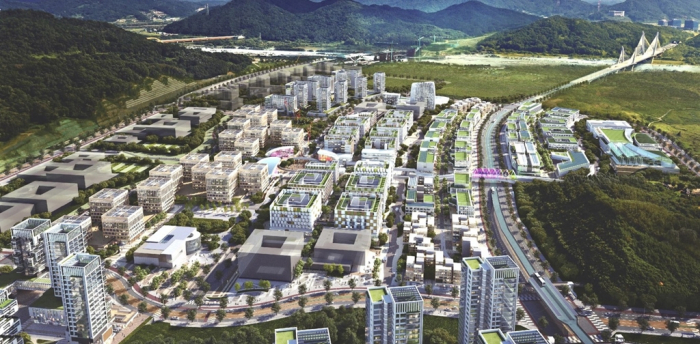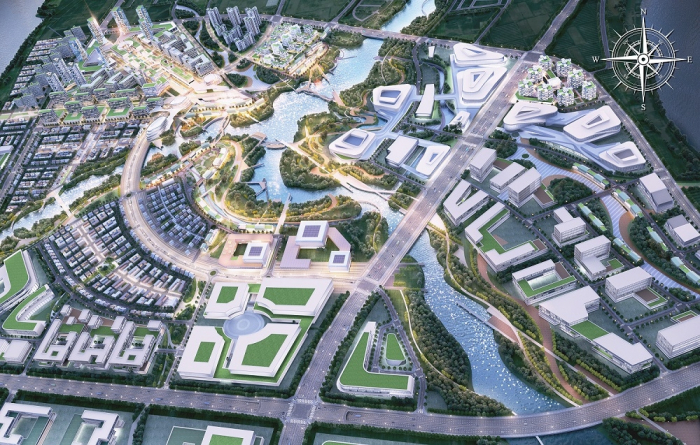Artificial intelligence
LG CNS chosen design consultant for Indonesia's $38 bn smart city project
S.Korea aims to develop the smart city business as a national growth engine, based on the successful construction of its digital cities
By Aug 08, 2022 (Gmt+09:00)
3
Min read
Most Read
LG Chem to sell water filter business to Glenwood PE for $692 million


Kyobo Life poised to buy Japan’s SBI Group-owned savings bank


KT&G eyes overseas M&A after rejecting activist fund's offer


StockX in merger talks with Naver’s online reseller Kream


Mirae Asset to be named Korea Post’s core real estate fund operator



LG CNS Co., a South Korean major information technology service provider, is set to consult on the design of an Indonesian smart city project worth up to $38 billion in the new capital of Southeast Asia’s largest economy.
Indonesia’s government has recently selected LG CNS, 35% owned by Macquarie Group, as a design consultant for the construction of a smart city in East Kalimantan, according to industry sources in Seoul on Sunday. Indonesia has decided to move its capital from the current Jakarta to the to-be-developed forest city on the island of Borneo.
A smart city, an IT-based new digital metropolis, provides autonomous driving vehicles, telemedicine, smart education, drone deliveries and other urban convenience services.
LG CNS, which included the smart city business as a long-term future growth sector, was known to establish new plans for key sectors such as the public transportation systems and the introduction of electric vehicles. The total value of the Indonesian smart city project was estimated at about 40 trillion-50 trillion won ($30.7 billion-$38.4 billion).
The LG CNS deal is predicted to help other South Korean companies such as Hyundai Engineering & Construction Co. win orders for the project, local industry sources hoped. Indonesian President Joko Widodo last month discussed possible cooperation for a smart city with Hyundai Motor Group Chairman Chung Euisun. Hyundai Engineering & Construction is the group’s building arm.
“The smart city sector will boost overall exports as it needs not only the IT business but also others such as the mobility, construction and healthcare industries,” said an industry source.
Global interest in the smart city sector is growing with the market forecast to nearly double to $873.7 billion by 2026 from $457 billion last year, according to a research company MarketsandMarkets.
KOREA’S CAPABILITIES
Indonesia was known to have evaluated South Korea's widely secured key smart city capabilities, industry sources in Seoul said.
South Korea has already been building demonstration smart cities in Sejong, a de facto administrative capital, and Busan, the country’s No. 2 metropolis, with total investment of 8.6 trillion won. The country aims to complete the project in Sejong by 2025 and the one in Busan by 2027.

The government plans to apply cutting-edge technologies to various areas such as commercial, business, residential and cultural sectors in the cities, which require cooperation among different industries and bolster their activities.
“South Korea’s government aims to develop the smart city business as a national growth engine based on the success of Sejong and Busan that will lead exports to other countries including Indonesia,” said the source.
SALES OF BILLIONS OF DOLLARS
LG CNS, a major smart city solution provider in South Korea, led both projects, working on the establishment and operation of the digital transformation. The company formed consortiums with companies in the artificial intelligence, data, autonomous driving, mobility, robot, healthcare, cybersecurity and finance sectors.
“It became more important to collect, analyze and draw the big picture in order to use data from all areas necessary to operate a city,” said Yoo Insang, the head of LG CNS smart city business group. “Sales of integrated platforms and solutions related to smart cities will result in big profits.”
A smart city is a long-term project that usually requires five years for building and 10 years for operations. Even after the building and operation contract expires, it is expected to bring the follow-up deals including those for management and updates.
“We target sales of billions of dollars from the smart city business in the next five to six years,” Yoo said.
Write to Ji-Eun Jeong at jeong@hankyung.com
Jongwoo Cheon edited this article.
More to Read
-
 Artificial intelligenceLG CNS launches AI robot subscription service for warehouse operators
Artificial intelligenceLG CNS launches AI robot subscription service for warehouse operatorsJun 22, 2022 (Gmt+09:00)
1 Min read -
 Research & DevelopmentLG CNS launches virtual factory and lab business
Research & DevelopmentLG CNS launches virtual factory and lab businessJun 09, 2022 (Gmt+09:00)
1 Min read -

Comment 0
LOG IN


